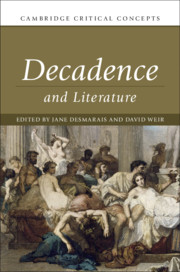Book contents
- Decadence and Literature
- Cambridge Critical Concepts
- Decadence and Literature
- Copyright page
- Dedication
- Contents
- Figures
- Contributors
- Acknowledgements
- Introduction
- Part I Origins
- Part II Developments
- Chapter 8 Decadence and the Visual Arts
- Chapter 9 Decadence and Music
- Chapter 10 Decadence, Parody, and New Women’s Writing
- Chapter 11 The Philosophy of Decadence
- Chapter 12 The Sexual Psychology of Decadence
- Chapter 13 The Theology of Decadence
- Chapter 14 The Science of Decadence
- Chapter 15 The Sociology of Decadence
- Part III Applications
- Select Bibliography
- Index
- References
Chapter 11 - The Philosophy of Decadence
from Part II - Developments
Published online by Cambridge University Press: 12 August 2019
- Decadence and Literature
- Cambridge Critical Concepts
- Decadence and Literature
- Copyright page
- Dedication
- Contents
- Figures
- Contributors
- Acknowledgements
- Introduction
- Part I Origins
- Part II Developments
- Chapter 8 Decadence and the Visual Arts
- Chapter 9 Decadence and Music
- Chapter 10 Decadence, Parody, and New Women’s Writing
- Chapter 11 The Philosophy of Decadence
- Chapter 12 The Sexual Psychology of Decadence
- Chapter 13 The Theology of Decadence
- Chapter 14 The Science of Decadence
- Chapter 15 The Sociology of Decadence
- Part III Applications
- Select Bibliography
- Index
- References
Summary
The philosophical origins of the concept of decadence lie with the German philosopher Arthur Schopenhauer (1788–1860). These ‘origins’ are retrospective, in that Schopenhauer was interpreted as the philosopher of decadence only in the late nineteenth century largely because of the work of Friedrich Nietzsche. More than any other philosopher of his era, Nietzsche conceptualized modern decadence on a grand and influential scale. He held decadence to be any condition, deceptively thought good, which limits what something or someone can be. This concept informs his critical and affirmative projects, acting as a versatile tool to identify and overcome his own decadence, and to resist the decadence of Western culture in five major areas of concern to Nietzsche: physiology; psychology; art and artists; politics; and philosophy. In each of these five areas the concept of decadence for Nietzsche serves to unmask valued cultural phenomena as corrupt; to name and analyse degenerate effects; and to spur reflection on how to respond.
- Type
- Chapter
- Information
- Decadence and Literature , pp. 184 - 199Publisher: Cambridge University PressPrint publication year: 2019
References
- 1
- Cited by



